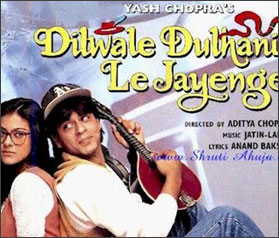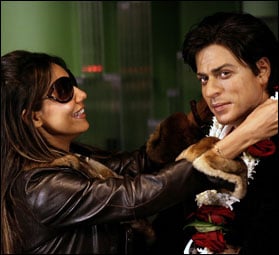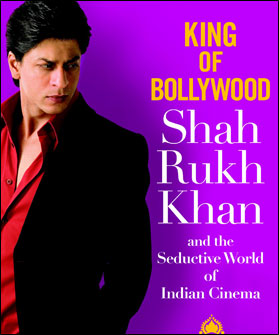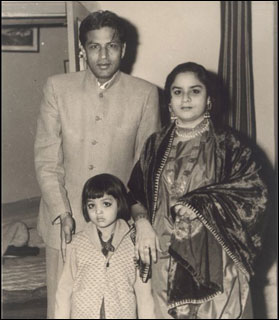|
|
| |
The
man who would be king
King of Bollywood by Anupama Chopra is a must read for all Shah
Rukh Khan fans as it takes readers into his life beyond the cinema
screen, explaining why and how he became India's most saleable brand.
By
Aamna Haider Isani |
| |
| King
of Bollywood Shah Rukh Khan and the Seductive World of Indian Cinema
By Anupama Chopra is an intelligently written and well researched
book that gives a detailed account of Shah Rukh Khan's very rugged
journey to recognition. It peddles through the alleys of the Qissa
Khawani Bazaar in Peshawar where his father, Meer belonged, New Delhi
where Shah Rukh was born and finally Bombay where he came in search
of stardom. But it isn't a biography, simply because the aim of this
book seems not only to document the life of the living legend but
to brand him as one of the winning stakes in a financially booming
India. The book actually essays the progress of India in relation
with the growing enigma of Bollywood and pinpoints Shah Rukh Khan
as the most sellable commodity in it. |
 |
| |
| Having
said that, it most certainly is a must read for Shah Rukh Khan fans
as it provides details of his life that add to his iconic stature
without dwelling too long on the flaws that might threaten it. Like
every typical formula block buster coming out from Bollywood, this
book too has Shah Rukh as the hero who at the end of the story emerges
as the good guy, the super star and the great actor despite the frequent
failures and flop films. In fact, after providing endless details
of his arrogance as a superstar, it ends with him being uncharacteristically
humble when he says, "I know it's going nowhere. At the end of
all the awards, rewards and adulation, I'll be an old man coming to
a function…Maybe I will be a small dusty man in a small dusty
town." |
| |
It's
as if Anupma Chopra is being defensive on his behalf which indicates
that she, like all of India, is too much in awe of him to write an
entirely realistic portrayal. The book is written as a fan's insight
into his life rather than a journalist's.
However, King of Bollywood SRK does provide interesting information
about the actor's life that one doesn't generally get to hear about
in the press; his relationship with the Underworld for instance. In
the chapter titled Mobsters and Movies, Chopra explains how 1997 became
"the year of living dangerously" in Bollywood. It follows
the film industry after the 1993 blasts in Mumbai and how in 1997
Abu Salem – "Dawood's trusted aide" – turned
his attention to Shah Rukh Khan. |
 |
| |
| "What
is the problem, sir?" the book narrates Shah Rukh when he received
his first call from Salem. As a high profile Muslim actor, SRK was
under threat as was most of Bollywood and was given police protection.
Salem replied that he was angered by Shah Rukh's refusal to work in
a project being made by a Muslim. Fortunately at the time Shah Rukh
happened to be working with several Muslim directors and pointed this
out to Salem: Mansoor Khan, Abbas Mustan, Aziz Mirza. "Salem
saw Shah Rukh's logic and decided that he would, after all, spare
his life. "Log bolte the tu bahut proudy hai lekin tu bada sharif
hai,' he said. 'Abhi police ki zaroorat nahin tereko. Main nahin maroonga." |
| |
Abu
Salem's calls continued, however, and Shah Rukh comments that it was
"like living under a telescope. It was very depressing and very
scary…I'm not macho enough to turn around and say that I wasn't
scared of any of these guys. I was shit scared."
It was an uneasy time in his career but according to the book, Shah
Rukh had faced so much depression and tragedy in his life that he
had learnt to find an unhealthy catharsis in his work. He threw himself
into films after the terribly tragic deaths of his father and mother
which are detailed in the book, giving insight into incidents that
were to mould this man's personality.
Shah Rukh had already debuted in television with the hit serial Fauji
but in 1991 when his mother died "Death created a star,"
the book states. "Shah Rukh sank into a fog of despair and anger…he
began to feel suffocated in Delhi. Two weeks after his mother's death
he packed his bags to Mumbai, and landed at Viveck Vaswani's hose
at 5 am. 'Let's make films,' he said." |
 |
| |
| That
was the year Shah Rukh Khan married Gauri and won his first Film Fare
Award for his debut in Deewana. The book portrays Shah Rukh as the
angry, stubborn and proud yet fearless actor that many fans identify
him as. "By September 1992, Stardust headlines were asking: CAN
THE INDUSTRY DIGEST SHAH RUKH KHAN'S ARROGANCE?" He was unapologetically
confident of his brilliance as an actor and had equally undiplomatically,
announced he would take over where Dilip Kumar and Amitabh Bachchan
had left. |
| |
This
is the SRK people see today, though they do not know much of what
made him into the man he is. This book takes one into circumstances
that make you feel stronger for him than any of his films can. He
comes across as a sad young man looking for love, with an eagerness
to please and yet being a daredevil to take on the toughest. That
he did by accepting to be cast in negative roles in films like Darr
and Baazigar; they were roles that Aamir Khan, Ajay Devgan and Sanjay
had declined from fear that they would "diminish their heroic
image."
Shah Rukh was cast as a last option but wow, what an impact these
films had on Bollywood. "They changed the rules for what constituted
a Hindi film hero," Chopra writes in the chapter Murder, He Wrote.
It was no longer necessary for a hero to be the good guy, the noble
knight in shining armor. "We don't have to like him," Shah
Rukh said of the modern day hero, "just the story he is telling." |
 |
| |
"Even
though Amitabh had earlier elicited the same passion, fans rarely
thought of Vijay and Amitabh as one. Vijay was working-class, seething,
and sophisticated. But with Shah Rukh, the distance between actor
and image blurred. The audience believed that Shah Rukh was Raj. He
became every girl's fantasy lover, every sister's brother, every mother's
son. In short, a superstar."
The book takes you through the friends he made, especially Aditya
Chopra and Karan Johar. It describes the effect each of his major
blockbusters had on Indian cinema; the fact that the Maratha Mandir
Theatre in south central Mumbai has been playing DDLJ on repeat ever
since its release in 1995. It also describes the impact his flops
had on his life. In The Fall from Grace the author takes into account
the period in SRK's career when he had launched his production company
Dreamz Unlimted with close friend Juhi Chawla and Aziz Mirza. It failed
to sustain itself and in 2003 when Shah Rukh cast Rani Mukherjee (a
new comer then) in place of Juhi in Chalte Chalte, the partnership
fell apart.
The book informs of all necessary statistics about Shah Rukh Khan's
life but at the same time it very notably evades all controversies
regarding his love life especially his rumoured romances with his
heroines, especially Juhi Chawla and Kajol. It portrays him as a morally
strong man committed and faithful in his marriage to Gauri. As an
actor he won't think twice before pushing his heroine off the ledge
(Baazigar) but will get squeamish in a romantic sequence, vowing never
to kiss on-screen. In essence, the book may go into the intricate
details of counting all the bones in Shah Rukh's body, but it doesn't
rattle any skeletons in his closet. In a way that fact also adds to
the man's powerful standing in India.
It builds him as a brand, throwing in his influence on Indian fashion
and marketing for good measure. "After Kuch Kuch Hota Hai was
released, the orange sweatshirts, which Rahul wears in the film, were
sold out at the Oxford Street Gap store in London." And SRK threw
himself into marketing the brand he had developed for himself. He
put a price on himself and would endorse any product for that price.
Here in Pakistan we have often wondered what motivates him to put
his name to everything from Pepsi to computers but the book clarifies,
"His reasoning was practical: He was an indiscriminate endoser-for-hire
because advertising money enabled him to do the films he wanted at
a reasonable price. For preferred producers such as Aditya and Karan,
there were no monetary discussions."
In a nutshell, the book answers questions about SRK's life as long
as these questions are not too invasive. It is highly recommended
for all those film enthusiast who are besotted with Bollywood as much
as they are with SRK. The book has been written by a true fan and
needs to be read like one too! |
| |
|

